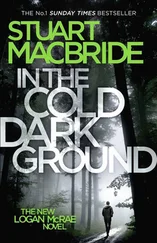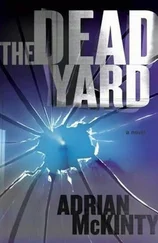Adrian McKinty - The Cold Cold Ground
Здесь есть возможность читать онлайн «Adrian McKinty - The Cold Cold Ground» весь текст электронной книги совершенно бесплатно (целиком полную версию без сокращений). В некоторых случаях можно слушать аудио, скачать через торрент в формате fb2 и присутствует краткое содержание. Жанр: Триллер, на английском языке. Описание произведения, (предисловие) а так же отзывы посетителей доступны на портале библиотеки ЛибКат.
- Название:The Cold Cold Ground
- Автор:
- Жанр:
- Год:неизвестен
- ISBN:нет данных
- Рейтинг книги:5 / 5. Голосов: 1
-
Избранное:Добавить в избранное
- Отзывы:
-
Ваша оценка:
- 100
- 1
- 2
- 3
- 4
- 5
The Cold Cold Ground: краткое содержание, описание и аннотация
Предлагаем к чтению аннотацию, описание, краткое содержание или предисловие (зависит от того, что написал сам автор книги «The Cold Cold Ground»). Если вы не нашли необходимую информацию о книге — напишите в комментариях, мы постараемся отыскать её.
The Cold Cold Ground — читать онлайн бесплатно полную книгу (весь текст) целиком
Ниже представлен текст книги, разбитый по страницам. Система сохранения места последней прочитанной страницы, позволяет с удобством читать онлайн бесплатно книгу «The Cold Cold Ground», без необходимости каждый раз заново искать на чём Вы остановились. Поставьте закладку, и сможете в любой момент перейти на страницу, на которой закончили чтение.
Интервал:
Закладка:
“Is she in at all?” I asked.
Hattie gave me a severe look. “Dr Cathcart has given me explicit instructions not to let you or any policeman into the surgery area. Now if you’ll excuse me I have to work to do.”
Matty grinned, slapped me on the back and steered me back outside into the rain.
“That’s harsh, brother, the good doctor is not a fan. You were shot down, mate! Shot down like the Red Baron,” Matty said.
“The Red Baron shot the other people down.”
“Not in the end, Sean. Not in the end!”
“Shut up! Shut up and drive us to Lucy Moore’s house. I wrote the address out on the map.”
“Will do boss, will do,” he said and laughed again.
Lucy’s parents lived on a large farm not far from Carrickfergus. Her father Edward O’Neill had been an old-school Nationalist, one of the few Catholic MPs in the Stormont Assembly and he was still well respected in Republican circles. There had been two girls, Lucy and Claire, and a son, Thomas. Claire was a contracts lawyer based in Dublin and New York. Thomas was a barrister in London. Lucy must have been the black sheep marrying a ne’er do well like Seamus Moore.
We parked the Land Rover and were shown in to the conservatory by Daphne O’Neill, a prematurely aged, grey-haired lady.
Edward was sitting by the window with a blanket over his knees. He was a big man brought low, like an exiled king or politician.
We drank tea.
Talked.
Neither Lucy’s mother nor father had anything to add. They were in mourning for a lost girl.
The worst thing in the world that could happen had happened.
Chief Inspector Brennan had already informed them about the baby.
They were bereft. Adrift in a sea of grief. They showed us the postcards and letters Lucy had sent from the Irish Republic. We, of course, had the photostats in our file and the originals gave us nothing new.
“Did Lucy drop any hint at all that she might have been pregnant to either of you or possibly to Claire?”
Lucy’s mother shook her head. She had high, arched cheekbones and a dignified white bun. Tears had been pouring down her face and she was somehow extremely beautiful in all that pain.
“Not a peep and she wasn’t showing or I would have noticed at Christmas.”
“Was she seeing anyone? A boyfriend or anyone new?”
“No! Not that we knew of. After finally divorcing Seamus? No. She had a lot of friends in the Sinn Fein crowd, but we all thought she’d lay low for a while. Oh Lucy, my darling, darling girl. I don’t understand it, I don’t understand it at all!”
“Is the baby still alive?” Mr O’Neill asked.
I was choking and I looked at Matty for help.
“We have every reason to think that it might be,” he said hesitantly. “Certainly we found no traces of a body in Woodburn Forest. Nearly two dozen infants have been left at hospitals and missions in the last week.”
The room grew quiet. Mr O’Neill cleared his throat and stared out the window. The long seconds became a minute.
“I know what some people say. They say it’s an Irish tradition. That it’s an ironic commentary on the famine. I don’t find anything ironic about it. Do you, sergeant?”
I was genuinely baffled. “Sir?”
“In India the Jains starve themselves to death to obtain purity in the next life. The philosopher Atticus starved himself in Rome because he had become sick and wanted to hasten the end. In Ireland there has never been honour in such a course. I don’t know how this so-called tradition got imported into our country!”
I had no answers for him. Clearly he blamed the hunger strikers for guilting Lucy into killing herself.
“Mr O’Neill, if we could find out where she’d been staying for the last six months it would help us a lot to piece together-”
“We don’t know!” Mr O’Neill snapped. “I wish we had known.”
“Perhaps one of Lucy’s friends would know?” I asked.
“We’ve asked everybody again and again!” Mr O’Neill said, banging his fist into the flat of his hand to emphasise his words.
“We’d like to talk to them anyway,” I said.
Mrs O’Neill calmed her husband down and they gave us half a dozen names, all of whom Carrick CID — that is, Matty and Crabbie — had interviewed after the initial disappearance.
Still we went back to the station and made the calls. Nobody had heard from Lucy since her disappearance, nobody had any insights into boyfriends or a pregnancy. The friends were Catholics, we were the police … it was a brick wall.
“Where to now?” Matty asked.
I looked at my watch. “I suppose we’ll go see our new friend Freddie Scavanni.”
We drove into Belfast along the M5. Burnt-out buses. A wrecked Saracen. A post-office van on fire. Soldiers walking in single file.
We parked the Land Rover at Queen’s Street RUC station.
Because of endemic fire bombs, blast bombs and bomb scares the roads into the city centre had been blocked. No cars were allowed into the heart of Belfast and all shoppers and civilians were searched at one of a dozen hastily built “search huts”.
A long line of uniformed civilian searchers patted you down, looked into your bag and waved you on past the canine officers. Once through the search huts you were free to walk the area around the City Hall.
This inner area was still heavily patrolled by the police and the army and with all these precautions it meant that the square mile of Belfast City Centre was one of the safest shopping precincts in the world. Bombers couldn’t get in and muggers, rapists and shoplifters couldn’t get out. Still, the search huts were a major fucking hassle and sometimes it took fifteen minutes to get through.
Of course plain-clothes detectives could just show their warrant cards and skip to the head of the line.
We heard “fucking pigs” and “SS RUC” behind us as we pushed through.
The civilian searchers were usually women and usually attractive young women at that, so it was a mixed blessing avoiding their attentions. The reason they were universally called civilian searchers was so that they could be distinguished from the agents of British Imperialism: the police, the army and prison officers. It was hoped that the IRA would never issue a communique designating them as “legitimate targets” and so far they had not. Unlike Matty and me, of course, who could be killed with impunity.
We walked to Bradbury Place and found Bradbury House in a cobbled street near Pottinger’s Entry. It was an older building that had recently been renovated and divided into various subunits: an optician, a travel agency, a hairdresser.
Suite #11 was on the second floor.
It was packed with chippies and painters and men in white boiler suits laying down phone lines.
Scavanni was standing there with one of the sparks examining a complicated fuse box that must have been put in shortly after World War Two.
He saw us and came over with a hand out although he looked annoyed as if he hadn’t really expected us to actually show up. I shook the hand.
“Mr Scavanni, if we could just steal you away for a few moments,” I said.
He sighed. “All right, Sergeant Dougherty, this way.”
“Fucker forgot your name,” Matty muttered as we followed him along a pastel-shaded corridor.
I shook my head. “No. He didn’t,” I replied.
Scavanni’s office was new and had nothing in it apart from a phone, a desk and a few plastic chairs.
He sat behind the desk, took his watch off and set it on the table.
“You have fifteen minutes,” he said.
Behind him there was a view of the Cornmarket where they had executed Henry Joy McCracken and the other leaders of the northern branch of the United Irishmen during the 1798 rebellion. That rising had been the last time when Protestants and Catholics had been on the same side; since then it had been divide and conquer in spades.
Читать дальшеИнтервал:
Закладка:
Похожие книги на «The Cold Cold Ground»
Представляем Вашему вниманию похожие книги на «The Cold Cold Ground» списком для выбора. Мы отобрали схожую по названию и смыслу литературу в надежде предоставить читателям больше вариантов отыскать новые, интересные, ещё непрочитанные произведения.
Обсуждение, отзывы о книге «The Cold Cold Ground» и просто собственные мнения читателей. Оставьте ваши комментарии, напишите, что Вы думаете о произведении, его смысле или главных героях. Укажите что конкретно понравилось, а что нет, и почему Вы так считаете.











